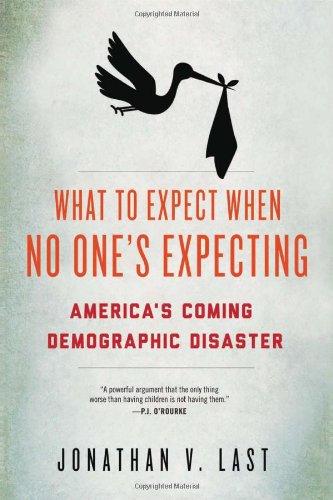Thus far, I’ve limited my discussion to the ways in which privilege and prosperity can impact our views about work outside of the home, but we needn’t forget the side effects that modernity might foster in an area that often consumes the rest of our daily lives: the family.
Just as most of our ancestors had few choices about where they glorified God in business (toiling for the feudal landowner), they also had few choices when it came to raising families (who they married, how many children they had, etc.). Whether due to lack of contraception, more practical material/financial concerns, or any number of other factors, for most families, children were simply a given.
Today, much like in our approaches to job-seeking, child-bearing has come to involve a significant degree of choice, and the overriding choice of the day seems definitive. As Jonathan Last points out in his book, What to Expect When No One’s Expecting: America’s Coming Demographic Disaster, birthrates in the Western world are in a free fall, with more and more adults opting for fewer and fewer kids, if any at all. Last offers plenty of nuances as to why this is happening, pointing to a “complex constellation of factors, operating independently, with both foreseeable and unintended consequences.” But on the whole, he concludes that “there is something about modernity itself that tends toward fewer children.”
The drivers range from declines in infant mortality (good) to changes in car seat laws (ehh) to spikes in abortions (eek), but throughout it all, it appears quite obvious that all trails lead to an increasingly libertine and consumeristic culture of choice. From contraception to in vitro fertilization to the ever-increasing array of economic opportunities telling us (not) to choose A or B at any given time, we are now incorporating a whole new assortment of inputs into our thinking about marriage and children-rearing.
Again, much like recent expansions in economic freedom, this brings both opportunity and risk, and whichever path we choose to take—no spouse; spouse; spouse + 1 child; spouse + 2 children; etc.—the outcome is bound to feed back into our economic engagements and vocational pursuits. To leverage this opportunity for the good, then, we would do well to recognize the impact that our newfound vocation-seeking will have on our family-building, and vice versa.
Yet more and more, we are viewing this as an either-or decision — pursue the dream and then pursue the family (marriage is a “capstone event”), or pursue the family and put the dream on hold. Instead, we should be striving for integration. Making the right choices about our family pursuits will involve submitting ourselves to God and transcending the same earthbound elements we struggle with in economics at large—prosperity, comfort, security, and happiness—connecting them to higher definitions not swayed by the car seat laws of the day, the supposed career prospects of a Master’s degree, or the availability of contraception.
Last relies mostly on data, avoiding direct and in-depth theological discussions about what God would or wouldn’t have us do when it comes to such integration. But the data do illuminate a connection between increasing secularization and drops in fertility. Likewise, Last notes an undeniable link between religious devotion and increases in birth rates.
As Last summarizes:
There are many perfectly good reasons to have a baby. (Curiosity, vanity, and naiveté all come to mind.) But at the end of the day, there’s only one good reason to go through the trouble a second time: Because you believe, in some sense, that God wants you to.
Tying things back to America, Last notes that “though America is a less devout country than it was two generations ago, we have, for the most part, resisted the secularist stampede.” Yet despite this standing, Last remains pessimistic about whether it can be sustained—whether, amid the rise of modernity, we can resist the rise of secularism and self-centered pleasure-seeking in our re-integration of family and vocation:
Perhaps, after wrestling for a century with the problems modernity has created, we’ll figure out how to balance liberalism, modern economics, and family life. I’m inclined to think not myself. But as always, hope must have the last word:
With a push toward “balance,” perhaps not.
But with a push toward earnest and deliberate integration toward a fundamental realignment of ourselves toward whole-life discipleship—from the ministry of the church to the ministry of business to the ministry of the family and beyond—there is hope for the family indeed.
